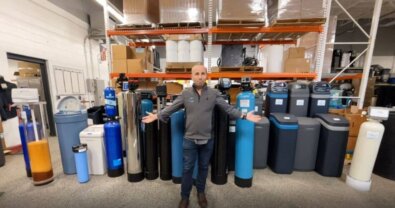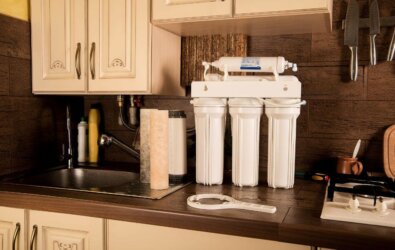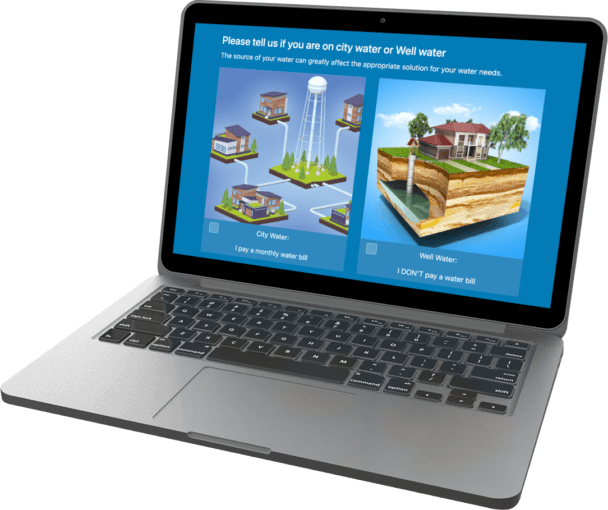Should I Get a Chlorine Injection System for Drinking Water with Bacteria?
In this article, you will learn:
The common types of bacteria in city water include coliform and E. coli.
Well water frequently contains more bacteria than city water, including coliform, E. coli and iron and sulfur bacteria.
Regular water testing is the best way to know what bacteria are in your water.
Carbon filters and UV light water filters can be effective at removing bacteria from city water.
Ozone filters are a viable option for filtering well water.
Chlorine injection systems are the best option for filtering both city water and well water because they provide the most protection.
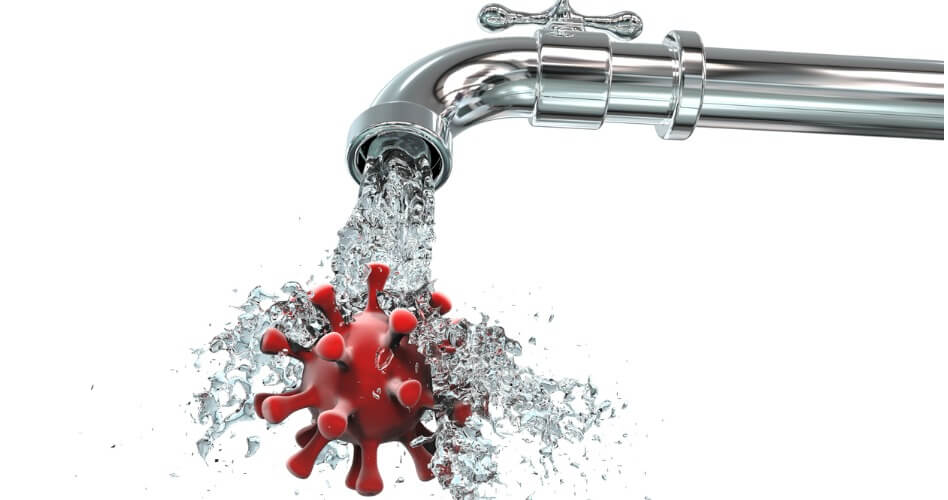
Learn About Chlorine Injection and Other Options for Filtering Bacteria from Your Water
We have good news and bad news for you. The bad news is bacteria are lurking in the water here in northern Illinois. But the good news is there are many filtration options available to defend against that bacteria!
One option you’ve probably heard of is a chlorine injection system for drinking water. And there’s a good reason for that. Home chlorination systems are quite popular in our region for their ability to neutralize harmful and nuisance bacteria. But are they the right choice for your water?
It’s good to ask this question and not assume chlorination is the way to go. After all, everyone’s water is different. Depending on the types of bacteria you encounter, there are other viable options to consider, such as UV light filtration or ozone filtration.
We want to help you make that decision! In this blog, we will show you what types of bacteria you are likely dealing with in your water. Then we will help you understand what chlorine injection systems and the other options can do to clean your drinking water.
What Kinds of Bacteria are Lurking in My Water?
Before deciding on what filtration option you should choose, we first need to explore the problem. Bacteria contamination is a huge issue for the water in our region. Both city and well water have been shown to contain different types of bacteria.
Let’s take a closer look at each type of water to see what we’re dealing with.
City Water Bacteria
Even though the government treats city water, that doesn’t mean the water doesn’t contain harmful bacteria. Unfortunately, bacteria can still find their way in.
We have seen this truth firsthand. Recently we had a customer discover that her city water was making her ill. Even though the government was doing their due diligence in treating it, our tests still found E. coli and coliform bacteria in her water. The reason for this? There was city work going on nearby her building. The workers had accidentally caused the contamination during their work.
This goes to show that the government cannot fully protect city water from pollution. We often see cases like the one above where coliform and E. coli creep into the water. In fact, those two types are the most common bacteria we see in city water.
Both contaminants can lead to some serious health problems. For example, E. coli can cause stomach illness, diarrhea, vomiting and wound infections. Coliform, on the other hand, are typically not harmful—although some types can make you ill. Nevertheless, coliform is a red flag because it indicates that many other dangerous germs could be lurking in the water.
In short, both E. coli and coliform often infiltrate city water. Therefore, it’s important to take precautions against them.
Well Water Bacteria
Well water, on the other hand, does not receive treatment by the government. Thus, there are more types of bacteria we frequently find in well water than in city water.
Like city water, well water often contains coliform and E. coli bacteria. This pollution often occurs when animal waste or other harmful things containing the bacteria get into the well’s aquifer.
Besides coliform and E. coli, naturally occurring sulfur and iron bacteria also regularly contaminate well water.
Iron and sulfur bacteria can cause all sorts of problems for homeowners. Here are a few of the most common issues:
- Rotten smell and taste
- Stains on sinks and toilets
- Clogs in plumbing equipment
- Diarrhea and sour stomach
- Bloating

Water Testing for Bacteria
Clearly, bacteria contamination is a major issue in both city water and well water. And bacteria aren’t the only contaminants. Problematic pollutants, such as lead and chromium-6, also loom large in our region. Because of this, we cannot stress enough the importance of regular water testing.
Whether you have city water or well water, you need to get the water tested at least once a year to know what you’re dealing with. Once the tests identify the types of bacteria in the water, you can then decide what filtration option you should choose.
What options are available? Let’s look at some of the best choices for getting rid of bacteria, including chlorine injection systems, ozone filtration and UV light filtration.
Want to get more helpful water information delivered to your inbox?
Sign up for our free email newsletter!
How Should I Filter the Bacteria in My Water?
So, what filtration option should you choose? The answer, of course, will depend on what types of bacteria you have in your water. As you will see, certain filtration options are better for city water, and others work better for well water.
Carbon Filters for City Water
For homes with city water, an activated carbon filter may be the right option for getting rid of bacteria. There are carbon filters on the market that can kill some microbiological contaminants like coliform. But it’s important to make sure the carbon filter you’re considering has that capability.
We would not recommend a carbon filter for removing bacteria from well water because these types of filters lack the capacity to get rid of iron and sulfur bacteria. Instead, these filters are perfect for water that has already gone through municipal treatment.
UV Light Water Filters for City Water
Another common solution for bacteria pollution is a UV light water filter. This device forces water to flow through a tube containing an ultraviolet light. This light scrambles the DNA of the bacteria, rendering them harmless.
Since UV light is highly effective at killing coliform bacteria and E. coli, it is ideal for homes with city water. However, the same cannot be said for homes with well water.
UV filters don’t work for homes with private wells, specifically because of the high amount of iron in the water. What happens is, as the water flows around the UV light, the iron begins to stick to the bulb. And soon, a thick layer of iron forms, making it impossible for the light to sanitize the water. Unfortunately, we have seen many customers experience this frustrating problem. It’s why they are not recommended in the state of Illinois.
Ozone Water Filters for Well Water
Another method popular for filtering bacteria is ozone filtration. Ozone water filters work by passing ozone gas through the water as it flows through the filter. The gas effectively disinfects bacteria, and its oxidizing properties enable it to reduce iron and sulfur bacteria in water.
Because it can take on iron and sulfur bacteria, an ozone filter is ideal for homes with well water. However, it is not as effective as other options at reducing the amount of coliform in the water. The filtration equipment also tends to be more expensive than other options. Plus, there are questions about the safety of the byproducts of ozone filtration, among other issues.
Ultimately, we see ozone filtration as a viable option for well water owners but not the best option. As we will see, a better choice is a chlorine injection system.
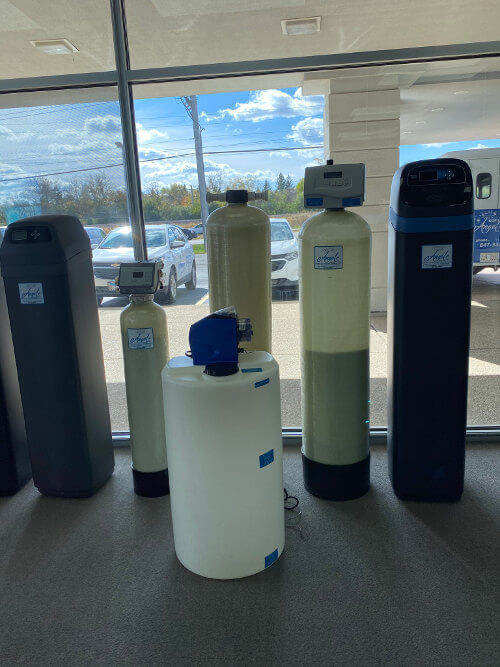
Chlorine Injection Systems for Drinking Water – Both City and Well
At Angel Water, we have been using chlorine injection systems for many years for one simple reason: they work the best. Owning a chlorine injection system is like having your own private water tower in your home.
Indeed, it works just like a city water tower. The system takes the water and feeds it into a tank where it is injected with chlorine. Once the chlorine has disinfected the water, the water then runs through a carbon filter, which removes the chlorine. This last step is crucial because it prevents you from ingesting too much harmful chlorine.
The best thing about chlorine injection systems is they are ideal for both city water and well water. They are effective at eliminating coliform, E. coli, iron bacteria and sulfur bacteria. The chlorine takes care of neutralizing all those harmful bacteria and more.
Plus, the system is more effective at cleaning the water than city water treatment. After all, unlike municipal chlorination systems, our chlorine injection systems take the extra step of removing the chlorine from the water after treatment. If you drink plain city water, you will likely wind up ingesting too much chlorine.
All in all, we trust chlorine injection systems most when it comes to removing bacteria because they provide the most protection. And that’s what we’re all about here at Angel Water: equipping you to protect your health and family.
Want a Chlorine Injection System for Your Drinking Water?
We hope this guide has helped you understand why you need to protect your water from bacteria and how to do it. Remember, while the government does some things to clean the water, they can never offer you full protection. It’s up to you to watch out for your health.
If you’re interested in testing your water or getting a chlorine injection system for your home, we can help! At Angel Water, we offer EPA-approved testing and quality chlorinators from trusted brands.
And no worries if you’re still not sure what product to choose. Our licensed experts can help you make an informed decision on which way to go. Give us a call today to discuss solutions for your water problems!
Interested in a Water Softener System for Your Home?
You don’t have to live with a dry, itchy scalp and brittle hair anymore! It would be our pleasure to help you find the right water softener to make your showers enjoyable again.
Please give us a call at (847) 382-7800 or visit our water softener page to learn more.
